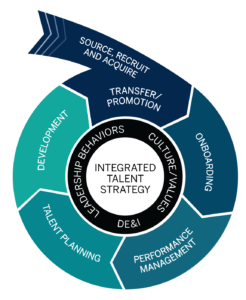
In today’s challenging business landscape, how organizations manage their talent is critical to driving sustainable growth and success. Building a winning talent management strategy is essential for attracting, developing, and retaining top talent. Organizations with strong talent management processes become employers of choice and can gain their “unfair share” of talent.
Building an integrated talent strategy requires developing consistent processes around your talent lifecycle.
The first step is to understand your organization’s values and set clear / measurable goals for talent management. It is crucial to align your talent management initiatives with your overall business strategy. By identifying the skills, competencies, and attributes needed to achieve your organizational goals, you can effectively focus your talent management efforts.
Once you understand your vision and how it aligns with your strategy, you can develop the leadership behaviors, culture and DE&I initiatives to support it. Knowing where you are and what you want to become will help you attract and retain employees that believe in your mission. An important early step is to ask employees about their experiences by conducting an employee engagement and culture survey, by and communicating the results. When you know where you are, you can create the roadmap to get to where you want to go.
You can develop processes for each step of the talent lifecycle to maximize the results of your talent management strategy.
- Effective Sourcing and Recruitment: Attracting and hiring the right talent is fundamental to any talent management strategy. Establishing well-defined job descriptions, sourcing a diverse range of candidates, and implementing robust selection processes are vital. Emphasizing a candidate’s cultural fit and alignment with the organization’s mission and vision can contribute to long-term success.
- Onboarding: New employees who do not feel supported during the onboarding phase are more likely to leave. Some estimates suggest that 20%-30% of new hires make the decision to leave within 6 months of joining. Having a robust onboarding strategy will help you keep the talent you invested so much to hire.
- Performance Management: A successful talent management strategy incorporates a robust performance management system that provides regular feedback, recognition, and rewards. A recent survey by the Sigred Group suggests that having weekly one-on-one conversations with your direct reports significantly impacts their willingness to stay with the organization.
- Talent Planning: Building a pipeline of future leaders is essential for organizational continuity. Identifying high-potential employees and implementing effective succession planning initiatives ensures that you are prepared for leadership transitions. Creating a pipeline will help you retain your key talent and know where to develop the programs, mentoring and coaching to ensure your organization’s continued growth.
- Employee Development Programs: Investing in the development of employees is critical for talent management. Providing regular training and learning opportunities not only enhances employees’ skills but also increases engagement and job satisfaction. Implementing personalized development plans, mentoring programs, and performance management systems helps individuals reach their full potential and contribute to organizational growth.
- Transfers and Promotions: Similar to onboarding, without additional support, newly transferred or promoted employees are also more likely to leave. It is important to create transition plans or “first 90 day” plans and provide your newly promoted employees with the coaching and mentoring support to ensure their success.
In building a successful talent management strategy you must encompass various interconnected elements, from aligning goals to nurturing leadership potential and prioritizing employee development and engagement. By integrating these key elements, organizations can attract, retain, and develop top talent, ultimately gaining a competitive edge and achieving long-term success.
Not sure where to begin? Take our free talent strategy assessment to receive a customized report on your talent management strengths and opportunities for improvement.


